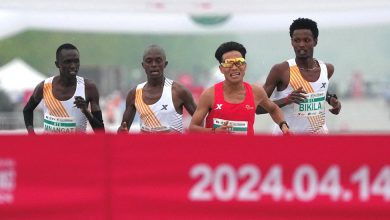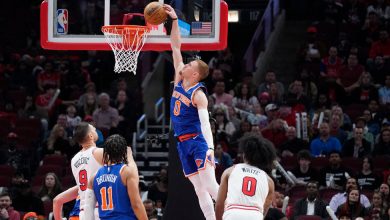An Olympian’s Plea Against War Resonated, but His Work Goes On

A little more than a month has passed since the end of the Beijing Olympics, but already the Games, like the ones before, have distilled into a handful of images and moments.
A teary, teenage Russian figure skater (who had failed a recent doping test) being berated by her coach. A triumphant American-born freestyle skier winning gold medals for China. The world’s top female skier trying to explain how she could not finish a race without falling.
And then there was the skeleton athlete from Ukraine holding a simple sign with four words on it in front of television cameras after one of his runs down the sliding track in Yanqing.
“NO WAR IN UKRAINE.”
Vladyslav Heraskevych finished 18th, but he will likely be remembered for far longer than the gold medalist.
“I wanted to show we are peaceful people and that we want to live normal lives,” Heraskevych, 23, said last week from his home in Zhytomyr, Ukraine, roughly 100 miles west of Kyiv, the country’s capital. “I didn’t really believe in these times a war could actually start. The Russian troops were all around Ukraine, but you also understand it is the 21st century and a war like this couldn’t happen in the middle of Europe.”
What Heraskevych had thought about to the exclusion of nearly everything else during the past year — his athletic career — dropped out of his mind on Feb. 24, when the first missiles began to land and Russian tanks began to roll across the border, though he was an early voice in the campaign to have Russia banned from international sports.
A number of Ukrainian athletes — from boxers to ballet dancers — have taken up arms against Russia in recent weeks. Heraskevych registered for the territorial defense but he has not been called into service yet, partly because he is a student with no military training, though he expects to be called to active duty before too long.
In the meantime, he is trying to make himself useful in the war effort. He and his father, who is the leader of Ukraine’s bobsled and skeleton federation, quickly realized that the team van could serve a valuable purpose in a nation under siege.
The most intense fighting has not reached his region, allowing him to spend his days trying to gather enough food, medical supplies and clothing to fill the team van. When he and his father have a sizable load, they set out for Kyiv, where they distribute their supplies to those in need.
A journey that would normally take no more than two hours has turned into a harrowing six- or seven-hour odyssey filled with checkpoints and last-minute route changes because roads are closed or bridges no longer exist. On one trip, the curfew forced them to pull over and sleep in the van on the side of the road.
“You could hear and see the explosions so clearly,” he said. “Then you arrive and you see all these destroyed buildings.”
Heraskevych has made a half-dozen trips into Kyiv. He is trying to set up a foundation so people can donate money and goods, but it has not been easy. The bureaucracy in Ukraine was never simple to navigate. The war has made it nearly impossible, with progress measured in little victories.
Here was his response on WhatsApp on Friday to “How was your day today?”
“The night was normal,” he wrote. “There were a couple of air danger sirens. I slept about 5-6 hours. Day was very busy, doing the work we need to do on the foundation. Today ordered an official stamp and already got it, applied for opening a bank account. And today there were a couple of interviews, I try to continue to cover the situation and tell what is happening with us.”
Russia-Ukraine War: Key Developments
The state of peace talks. Pessimism about Russia’s willingness to tame its attacks in Ukraine is growing amid mixed signals from Kremlin officials on peace talks and reports of new strikes near Kyiv and Chernihiv, where Russia had vowed to sharply reduce combat operations.
A humanitarian corridor. A humanitarian corridor to allow people to leave the besieged city of Mariupol, and let aid inside, appeared to be close to being implemented. The International Red Cross said the corridor could begin on April 1.
Rising energy prices. OPEC and its allies, including Russia, decided to stick with its plan of modest monthly increases in oil input. In response to rising oil prices, President Biden announced he would release up to 180 million barrels of oil from emergency reserves over the next six months.
Putin’s advisers. U.S. intelligence suggested that President Vladimir V. Putin had been misinformed by his advisers about the Russian military’s struggles in Ukraine. The Kremlin later dismissed the assessment as a “complete misunderstanding” of the situation in Moscow.
Late last week, he traveled to Vinnytsia, about 80 miles south of his home in Zhytomyr, to check on his grandparents and other relatives who have chosen to stay behind.
He has appeared on Western television numerous times, trying to take advantage of the exposure from his demonstration at the Olympics to tell the world what has become everyday life in his country. The International Olympic Committee prohibits political speech on the field of play and in other areas of competition venues but did not penalize Heraskevych.
As best as he can, he is trying to keep an eye on Russia’s involvement in sports and making sure the bans that have been issued remain in place and in some cases are expanded.
All of the country’s symbols have been erased from competitions, and its teams have been barred from major events, such as qualifying for the 2022 World Cup in Qatar later this year, and team play in international tennis. However, World Athletics, the global governing body for track and field, has been one of the few organizations to prohibit individual Russian athletes, as well as those from Belarus, from competing. Athletes from those countries are barred from the World Athletics championships in Oregon this summer.
Heraskevych said sports leaders needed to closely monitor anything a Russian athlete says or does that might be seen as supporting the war, and that athletes should be barred from competition for life if they supported Russia’s war in any way. He believes that since athletes have platforms, their words and deeds can quickly be used as propaganda that rallies support for the continuation of fighting and bombing that kills innocent civilians.
“In doping matters, an athlete deceives others and harms his health,” he said. “In the case of war propaganda, he also deceives others, but at the same time he also destroys other people’s lives or takes their lives.”




